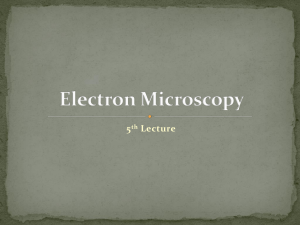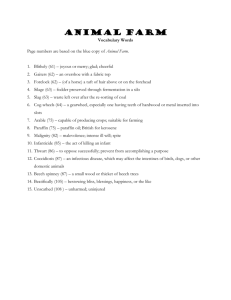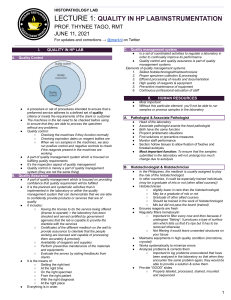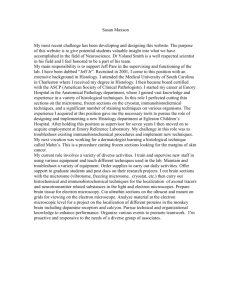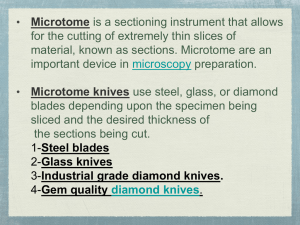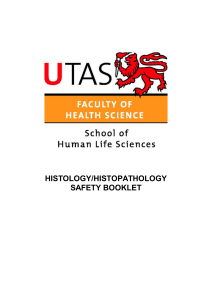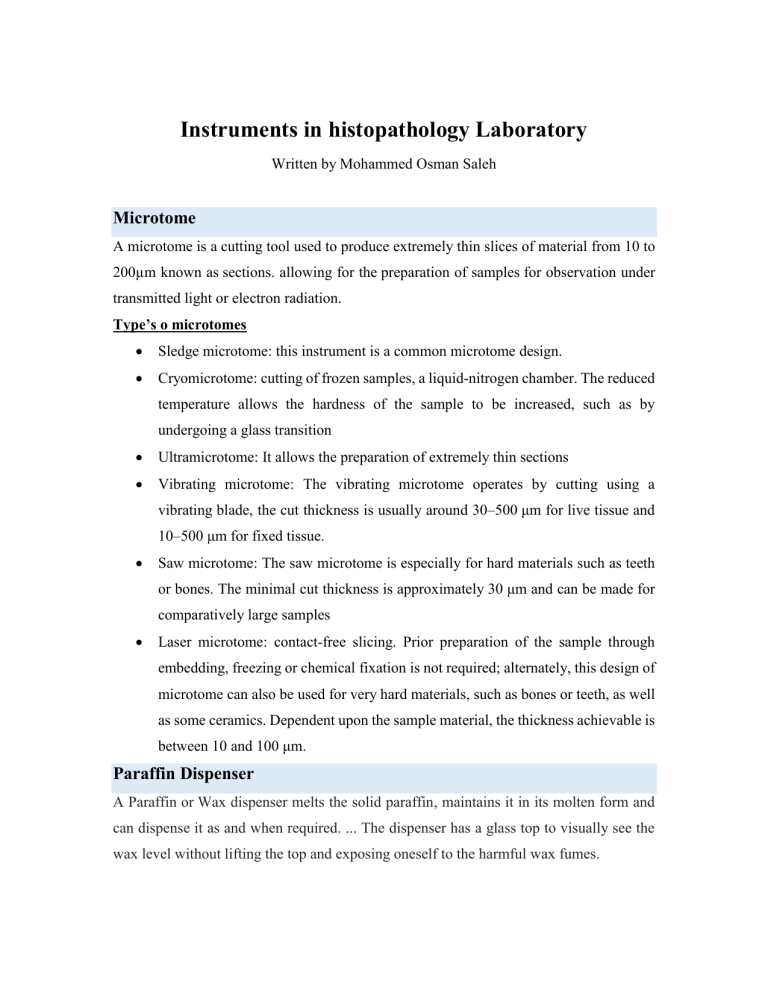
Instruments in histopathology Laboratory Written by Mohammed Osman Saleh Microtome A microtome is a cutting tool used to produce extremely thin slices of material from 10 to 200µm known as sections. allowing for the preparation of samples for observation under transmitted light or electron radiation. Type’s o microtomes Sledge microtome: this instrument is a common microtome design. Cryomicrotome: cutting of frozen samples, a liquid-nitrogen chamber. The reduced temperature allows the hardness of the sample to be increased, such as by undergoing a glass transition Ultramicrotome: It allows the preparation of extremely thin sections Vibrating microtome: The vibrating microtome operates by cutting using a vibrating blade, the cut thickness is usually around 30–500 μm for live tissue and 10–500 μm for fixed tissue. Saw microtome: The saw microtome is especially for hard materials such as teeth or bones. The minimal cut thickness is approximately 30 μm and can be made for comparatively large samples Laser microtome: contact-free slicing. Prior preparation of the sample through embedding, freezing or chemical fixation is not required; alternately, this design of microtome can also be used for very hard materials, such as bones or teeth, as well as some ceramics. Dependent upon the sample material, the thickness achievable is between 10 and 100 μm. Paraffin Dispenser A Paraffin or Wax dispenser melts the solid paraffin, maintains it in its molten form and can dispense it as and when required. ... The dispenser has a glass top to visually see the wax level without lifting the top and exposing oneself to the harmful wax fumes. Paraffin Block Trimmer Wax Block Trimmer+ efficiently removes excess paraffin from the outside of a tissue cassette following embedding. The edges and writing surface of the tissue cassette are dewaxed effortlessly by passing the paraffin block across the patterned heated work surface. Melted paraffin wax is then collected in a disposable collection pot. The Block Trimmer allows users to prepare tissue blocks with no risk of damage to the printed text or barcode on the tissue cassette. It incorporates an ultra-fast heating system for rapid warm up, which combined with an extra-large heated work surface, allows multiple blocks to be passed across the work surface at one time. Block Wax Trimmer Removing excess paraffin from embedding tissue cassettes. used with all sizes of biopsy and mega cassettes. The grooved, heated surface channels melted wax into a removable collection tray that stays in place at the base of the unit by magnetic contact. Slide Warmer Quickly drying slides. Slide Dryer Designed to be used at the microtome for improved LEAN workflow. Air at a digitally controlled temperature is blown through the base of the instrument for rapid and efficient section drying without the risk of overheating the specimen. With this system, drying times can be reduced by approximately 75% compared to conventional ovens. Tissue Floatation Water Bath Tissue flotation bath is required after the step of cutting paraffin sections and before these are placed on slides. It lets tissues relax and smoothen before being mounted on slide as well as makes paraffin stick to the slide. This ensures removal of wrinkles and folds before sections are placed on the slide. Ovens These laboratory ovens can be used for sample drying, baking, annealing, conditioning, sterilizing, evaporating and dehydrating. Microscope Histology is the study of tissue morphology using light or electron microscopy. Centrifuge Magnetic Stirrer Tissue Processor A tissue processor is used to prepare tissue samples for analysis by fixing, staining, dehydrating or decalcifying them. The processors are mostly single unit devices that can accommodate a variety of processing techniques to suit the different needs of the laboratory, therefore improving the efficiency of tissue processing.
